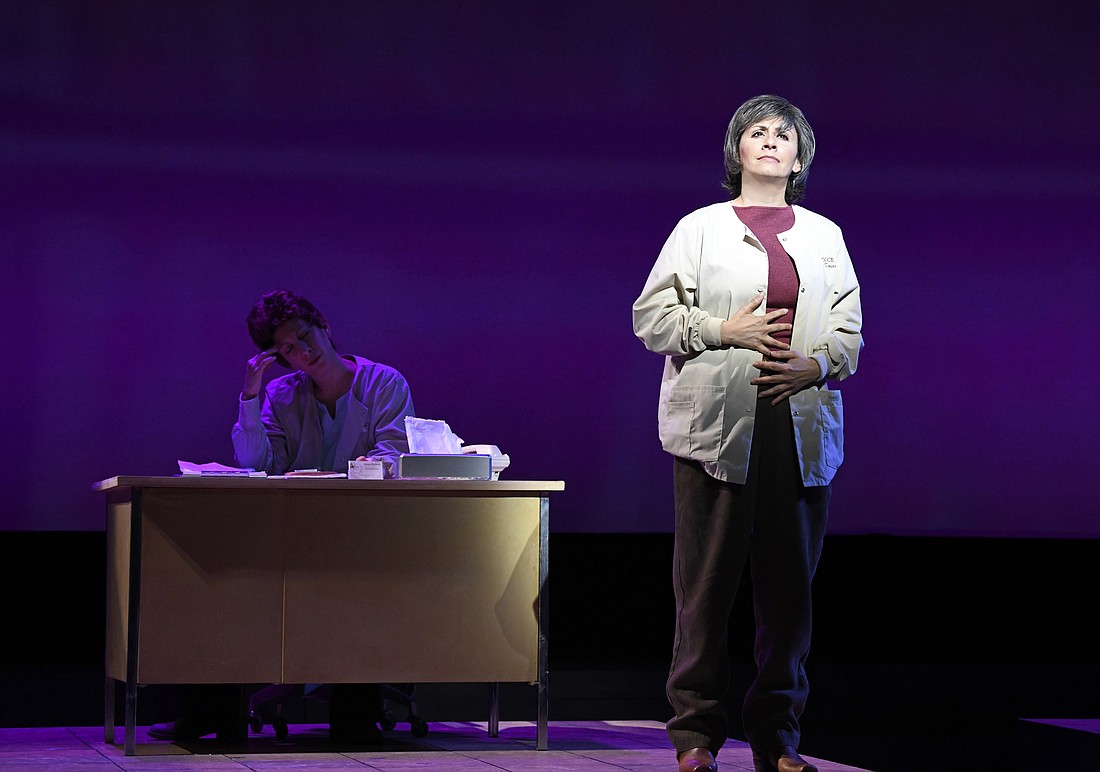- April 25, 2024
-
-
Loading

Loading

The plaintiff gets her day in court in Lisa Loomer’s “Roe,” which is now in session at the Asolo Rep. As a matter of fact, she gets all the days of her life. (More on that later.)
Loomer’s play revolves around “Roe v. Wade,” the 1973 United States Supreme Court decision which (with various stipulations) established a woman’s right to an abortion through the first trimester of pregnancy. It’s a pro-choice play, in case you’re wondering. The playwright tries to be fair to both sides, but she definitely takes a side.
I was expecting a serious play. A courtroom drama, packed with heavy issues and deeply deep discussions. Well, there’s plenty of that. But “Roe” is also entertaining. And funny. Imagine my surprise.
The first act is positively zippy. Yes, the play digs into serious issues. But it doesn’t take itself too seriously, and it’s often laugh-out-loud funny. Yes, there are soapbox moments worthy of Oliver Douglas’ lectures on “Green Acres.” But every time that happens, the playwright pokes a pin in the rhetorical balloon.
The action revolves around “Jane Roe,” the legal pseudonym of Norma McCorvey (Terri Weagant). Her character pushes all the trailer trash buttons. She’s a wild thing — a lesbian, but not picky on the subject. Norma drinks too much, smokes too much, and gave birth to two kids as a teenager. She’s not too keen on going through the experience a third time at the age of 22.
Sarah Weddington (Bri Sudia) is Norma’s upright opposite. She’s a Texas lawyer: young, gifted and white. Defying the odds, Sarah and her legal partner Linda Coffee (Colleen Lafeber) want to launch a trial case to knock down their state’s draconian anti-abortion law. After a fateful meeting in a pizza parlor, they make Norma their poster child. After that, the play speed-marches you to the Supreme Court and ropes you in with a clever theatrical device. The live actors play off against recordings of the actual deliberations. The justices get to speak for themselves.
Loomer’s distillations of the complex legal arguments are not too shabby. She gives you a lucid sense of the opposing positions and what’s at stake. Her distilled deliberation leads up to the final decision. The curtain closes, and it feels like the play’s climax.
But this is “Roe,” not “Roe v. Wade.” That’s only the first act.
The second act has lots of compelling material. You find that Norma becomes a tool of the pro-choice movement and then has a religious conversion causing her to become a tool of the right-to-lifers. Sarah winds up perpetually arguing the same case she won in 1973. It’s fascinating stuff — a mix of tragedy and farce. Even so, the second act feels anticlimactic after the landmark decision.
Loomis tries to keep you guessing and never sinks into predictable rhythms. Director Lavina Jadhwani follows the playwright’s fancy footwork. She’ll turn on a dime, and shift the tone from trash TV to ponderous docudrama before you know what hit you. (According to the program, she followed the lead of Bill Rauch, the director of the original production.)
The actors sink their teeth into their well-written characters. Sarah and Roe tangle over the fault lines of the personal and political. Sudia’s Sarah is a selfless true believer, but not exactly a people person. For Sarah, the Roe case is a matter of principle. She wants to change law; she wants to change history. For Weagant’s Norma, it’s deeply personal. She just wants to have an abortion. When Norma does get caught up in causes, she’s in over her head, and pulled in a tug-of-war by the opposing sides. That mercurial selfishness leads to a personal betrayal of Connie, Norma’s lesbian partner. Michelle Aravena brilliant portrays Connie as the only person who ever cared for Norma as a human being, and didn’t give a damn about causes. Nate Burger avoids Elmer Gantry stereotyping as the Operation Rescue minister who pulled Norma into his born-again world.
The combination of Rachel Hauck’s sets and Wendall K. Harrington’s multimedia artistry brilliantly evokes the media circus this all became. Tracy Dorman’s costumes are period accurate, with a dash of satire. Her depiction of the big-shoulder, big-hair ’80s is a hoot. (Kudos to Michelle Hart for the wig wizardry.)
“Roe” is a historical story. But history rarely gets the story straight. Norma McCorvey and Sarah Weddington both wrote their share of books, and the story varies, depending on which one you read. Instead of taking sides, Loomis plays the “Rashomon” card. Her play unfolds as a post-modern montage of conflicting narratives. Characters also break the fourth wall and comment on their obituaries and Wikipedia entries. It’s funny, but poignant. Like it or not, tombstones and Wikipedia always have the last word.
Loomis’ play begins and ends with a cacophonous argument. The playwright’s position is unambiguou, though she doesn’t pretend her play will end the argument.
Whatever side you take, “Roe” probably won’t change your mind.
But it will fill your mind with questions. And offer a hint of the flesh-and-blood people whose lives depend on the answers.